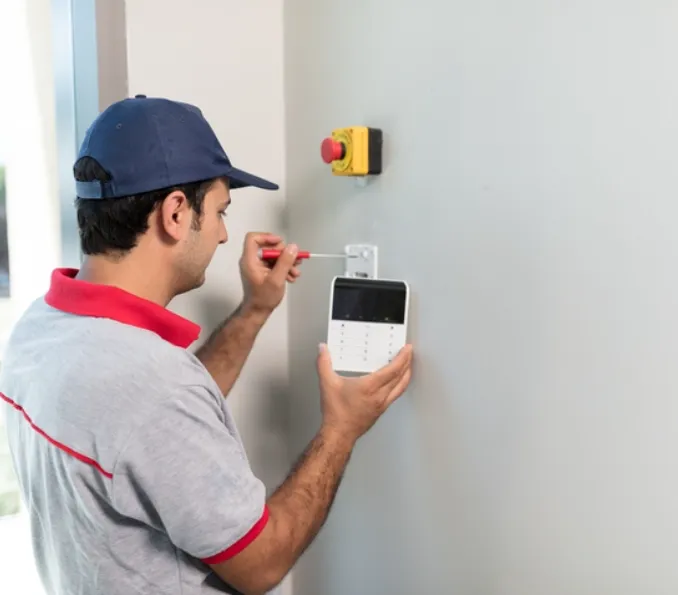For first-time homebuyers, finding ways to save on long-term expenses is often a priority. One of the most effective ways to reduce your home insurance premiums is by installing a security system.
Every 15 seconds, a burglary occurs in the U.S., adding up to more than 2.2 million burglaries each year. Homes without security systems are much more likely to fall victim to break-ins compared to those that are protected. Insurance companies know this, and many offer discounts for homes with security systems, recognizing them as a valuable deterrent against crime.
Does Installing an Alarm System Lead to Lower Insurance Rates?
In most cases, adding a monitored security system to your home can lower your homeowners insurance premiums. Many insurers offer discounts to policyholders who have home alarm systems installed, as these systems significantly reduce the risk of break-ins.
Even though burglaries in the U.S. have been decreasing over the past few decades, they are still a concern. In 2021, there were still over 314 burglaries per 100,000 people. Installing a home security system makes your property less appealing to criminals, lowering the likelihood of a break-in. As a result, insurance providers may reward you with lower premiums for making your home more secure.
Benefits of a Security System for Home Insurance
- Reduced Risk and Discounts: A security system helps prevent burglaries, which means fewer claims for the insurance company to handle. Since fewer claims result in lower costs for the insurer, they may pass on the savings to you in the form of discounts. Check with your insurance provider to find out if they offer any discounts for having an alarm system.
- Lower Premiums: With a security system in place, your insurance premiums may drop. Insurance providers calculate premiums based on the risk level of the property, and a well-secured home is considered a lower risk. Depending on the system you install, you might see a reduction in your premiums. Some homeowners report savings of up to 15%, which could amount to a reduction of about $100 per year.
- Long-Term Savings: A home security system can also help protect you from future increases in insurance premiums. Over time, as your security system proves effective, your premiums are less likely to rise. With fewer incidents to report, your insurer will likely reward your proactive approach to home protection.
The Role of Monitoring and Additional Features
For the best chance at saving on your premiums, most insurance companies require that your security system be professionally monitored. A self-installed or unmonitored system may not provide the same level of discount.
Additional features, like security cameras, water leak sensors, fire extinguishers, and smoke detectors, can further reduce your insurance costs. These enhancements provide extra layers of protection, which in turn lower the risk for your insurer. For instance:
- Security Cameras: Installing 24/7 monitored cameras can significantly lower premiums, as they are a strong deterrent to criminals.
- Leak Detection: Some systems offer leak sensors, which can detect water or gas leaks, potentially saving you money by preventing expensive damage.
- Fire Prevention: Fire extinguishers, along with sprinkler systems and smoke detectors, can also lead to discounts, as they reduce the chances of fire-related damage.
Types of Security Systems That Can Lower Insurance Costs
When choosing a security system, there are several options to consider. Both professional installation and DIY systems come with their advantages, depending on your needs and preferences.
- Professional Installation vs. DIY: Professional installation ensures the system is set up correctly, and many providers will monitor the system for you. Although it’s usually more expensive, professional monitoring is often required to qualify for the best insurance discounts. On the other hand, DIY systems can be cheaper, but you’ll need to install and monitor them yourself.
- Wired vs. Wireless Systems: Wired systems are connected through physical cables, while wireless systems use cellular networks to communicate. While wireless systems are easy to install and are often available in home improvement stores, they may require more maintenance and battery replacements. Wired systems, although more complex to install, tend to be more stable.
How Gated Communities Affect Insurance Rates
Living in a gated community can also result in insurance savings. Gated communities limit access to the neighborhood, reducing the risk of crime. In some cases, communities with higher security, such as those with 24/7 patrols or security guards, may offer even greater discounts.
Conclusion
Installing a security system in your home is one of the smartest ways to reduce your insurance premiums. With a variety of systems available, from basic alarms to comprehensive smart home security solutions, homeowners can find the right level of protection to fit their needs. The peace of mind that comes from knowing your home is secure is invaluable, and the added benefit of lower insurance costs makes it a win-win situation for most homeowners.
Consider reaching out to your insurance provider to see how much you can save by upgrading your security system.




